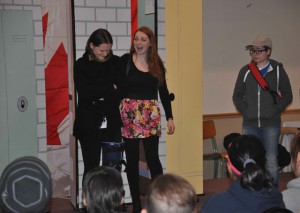 When four Perth teenagers take to the stage of the Royal Canadian Legion (Perth-on-Tay branch, 26 Beckwith Street East) this Saturday, April 18 at 2 pm with the presentation of a new play, “Listen Up, Perth!”, their performance will reflect a wide variety of issues facing young people not only locally but around the globe.
When four Perth teenagers take to the stage of the Royal Canadian Legion (Perth-on-Tay branch, 26 Beckwith Street East) this Saturday, April 18 at 2 pm with the presentation of a new play, “Listen Up, Perth!”, their performance will reflect a wide variety of issues facing young people not only locally but around the globe.
To view the performance on YouTube, click HERE.
Developed by Burning Passions Theatre (the parent company of the Classic Theatre Festival), “Listen Up, Perth!” tackles a lot of the issues that teenagers often face in isolation and silence, but which represent a social challenge across Canada and around the globe. Issues ranging from depression and bullying to drug abuse and self-harm – as well as a major shortfall in appropriate social services to respond to the problems – make up the daily backdrop of a large number of young people. The play serves as a wake-up call for adults who are either unaware, or who are sympathetic but unsure how to provide support.
That local teenagers are experiencing high levels of anxiety and stress is no surprise. The difficulties faced by young people in Perth and surrounding Lanark County have come into sharp focus in recent years due both to a spate of teen suicides as well as the economic challenges facing many in the area. A 2010 report from the Child  and Youth Health Network for Eastern Ontario, showed 27.5% of all respondents between the ages of 15 and 19 in Leeds, Grenville and Lanark indicated they have “quite a lot of stress” in their lives, approximately 10% more than the average across Ontario. That same report found that on a wide range of indicators measuring mental and physical well-being, children and teens in Lanark, Leeds, Grenville emerge as among the least healthy in Eastern Ontario. Among those indicators, the three counties have the highest rates of smoking, drinking, and obesity, contributing to poor mental and physical health.
and Youth Health Network for Eastern Ontario, showed 27.5% of all respondents between the ages of 15 and 19 in Leeds, Grenville and Lanark indicated they have “quite a lot of stress” in their lives, approximately 10% more than the average across Ontario. That same report found that on a wide range of indicators measuring mental and physical well-being, children and teens in Lanark, Leeds, Grenville emerge as among the least healthy in Eastern Ontario. Among those indicators, the three counties have the highest rates of smoking, drinking, and obesity, contributing to poor mental and physical health.
Seeking help is no picnic, as an August 2013 report by the Children’s Hospital of Eastern Ontario and the Royal Mental Health Centre found: the number of children and youth seeking mental health assistance grew 64% since 2009, with suicide risk admissions up 33% and self-injury patients up by 61%. Unfortunately, the waiting list for young people seeking services is an average of one full year.
The sense of disconnection young people often feel from parents, teachers, fellow teens, and the community at large is reflected in a wide range of reports, especially the Final Report of the Standing Senate Committee on Human Rights, which gave Canada a failing grade with respect to children’s rights, noting such rights “are being pushed to the side and even violated in a variety of situations.” The report, entitled The S ilenced Citizens, noted that “children’s voices rarely inform government decisions yet they are one of the groups most affected by government action or inaction. Children are not merely underrepresented; they are almost not represented at all. The Convention on the Rights of the Child properly puts children at the centre, in the context of their family, their community, and their culture. Nevertheless, there is a real gap between rights rhetoric and the reality of children’s lives in Canada – many people in Canada and elsewhere continue to resist full implementation of the Convention.”
ilenced Citizens, noted that “children’s voices rarely inform government decisions yet they are one of the groups most affected by government action or inaction. Children are not merely underrepresented; they are almost not represented at all. The Convention on the Rights of the Child properly puts children at the centre, in the context of their family, their community, and their culture. Nevertheless, there is a real gap between rights rhetoric and the reality of children’s lives in Canada – many people in Canada and elsewhere continue to resist full implementation of the Convention.”
In September 2013, the Canadian Coalition for the Rights of Children noted its disappointment that despite a series of United Nations recommendations to improve the plight of Canadian children, “There are no new actions or commitments, despite evidence of lapses in the protection of Canada’s children and clear opportunities to improve their well-being.”
Whether the issue is youth unemployment in Ontario – which the Canadian Centre for Policy Alternatives recently reported rivals that of the U.S. rust belt – or the global view of children by the United Nations agency UNICEF (whose leader said 2014 was “a pretty crummy year to be a kid,”) it is clear that young people are often feeling despair and hopelessness.
The four young people who came together with director Laurel Smith to develop the themes and stories of “Listen Up, Perth” – Tara Kreissler, Kaley Michelle McQuillan, Kai Archer and Kaija Evangelho – have already found that using theatre to find hope is a remarkable process. They saw this first-hand when they performed the play at a recent national youth centres conference in Ottawa. The post-show discussion, hugs, tears, and laughter they shared with hundreds of young people from all parts of the country affirmed that their story hit home.
Admission to the April 18 performance of “Listen Up, Perth!” is by donation, though no one will be turned away for lack of funds. For more information call (613) 264-8088.





